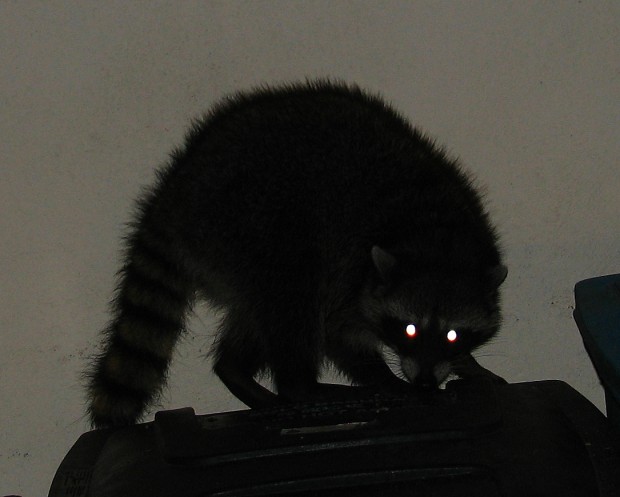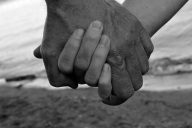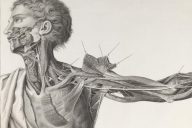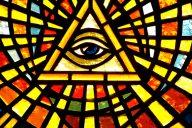“He saw his reflection in Tre’s shades–aviators, white mask–they looked as though they were about to rob a bank.”
The summer before Henry dropped out of college, his mother died of Histoplasmosis, a fungal infection in the lungs caused by breathing in fecal spores. The neighbors found her lying on the front lawn, perfectly aligned from head to toe, hands clasped over her chest. Henry could only assume the coughing became too much, the fever too ardent, so she got off the couch, stumbled through the mountain of junk she’d accumulated, and headed outside in a desperate bid for fresh air. She probably laid herself on the cool grass, the dew subduing the heat as she faded out.
He could only assume because he wasn’t there. He could only tell Tre what he knew—his mother had died from breathing in filth. Tre nodded, his eyes hidden behind black wraparound shades. Henry wondered if the shades ever came off, wondered if Tre was trying to hide the fact that he was famous. Henry knew exactly who Tre was and struggled keeping it to himself.
Tre swiped at his thick, ropy dreadlocks, his hands encased in black latex gloves. They were both wearing those gloves. Henry caught his reflection in Tre’s black lenses, pulled the aviators out of his shirt pocket and slid them onto his face.
Aunt Rachel had hired Tre’s company to come and haul everything out of the house because it was a rancid mess. Histoplasmosis was commonly transmitted through bat guano, but in the case of Henry’s mother, it had come from a family of raccoons living in the crawlspace above her ceiling. Their excrement absorbed into the insulation, swelling like a diaper, sagging the ceiling until the swampy mess burst all over the cluttered dining room table.
Henry’s parents had divorced when he was eight. He remembered sitting in the judge’s chambers, everyone telling him it would be best if he’d lived with his father. He remembered his mother kneeling before him, telling him to be a good boy, hugging him a little too hard. He remembered being overpowered by her perfume, looking up at his father, who nodded and told him everything was going to be okay.
The Christmas after the divorce, his father came into his room and told him his mother had wandered into traffic in her underwear, holding a knife, threatening anyone who came near her. This was the last time anyone spoke of his mother, until two weeks ago, when Aunt Rachel called to tell him she’d died. Somewhere in the eleven years since he last saw her, his mother’s home had become a maze of milk crates and cardboard boxes, an elephant graveyard of fly-spattered Burger King bags and KFC buckets, her dirty clothes curled on the carpet as if they’d died where they fell.
Everything smelled horrible.
I don’t understand, Henry had said to Aunt Rachel.
We wanted to help her, Henry, she said. We really did.
Henry peered up at the browned underside of the palm tree in the front yard, its dead fronds like the scales of a fried fish, while Tre scribbled notes on his aluminum clipboard. The Treveon Conroy. Henry could hardly believe it—the same Treveon Conroy who’d played for the Dolphins until a shattered femur against the Redskins. He couldn’t wait to tell his father.
You’ll never guess who I was with today, Henry would say.
You’re kidding. That guy was great.
Remember the Rose Bowl?
Aw, that wasn’t his fault. He had a hell of game until that fumble.
Guy was a beast.
He really was. You say anything?
I didn’t want to embarrass him.
Hell of a player. Shame what happened.
Henry and his father wouldn’t be referring to the broken femur, but of the off-season DUI, the overturned Ferrari 360, the dead waitress who rode shotgun, the Vehicular Manslaughter conviction. As he stared at his reflection in Tre’s wraparound shades, he remembered the mugshot ESPN had shown over and over, the lingering sadness in Tre’s eyes. Henry couldn’t stop staring at Tre’s massive biceps, the thick veins branching down his forearm like roots—still looked like a pro athlete—and wondered if the sadness was still there, if it had always been there, wondered how Tre ended up working for this hauling company. Henry squinted as he wiped the lenses of his aviators on the hem of his shirt. He put the sunglasses back on and cleared his throat.
So just to warn you, it’s a mess in there.
Tre smiled, nodded. Henry’s phone buzzed, a text from his aunt wondering if they were inside. Henry gripped the phone tightly. He could hear it creaking in his palm. Seagulls squawked from the roof.
Wouldn’t sweat it too much, man, Tre said. I’m sure I’ve seen worse.
The phone slipped out of Henry’s hand as he tried to shove it into his pocket, fell onto the concrete walkway. He picked it up. The front display had cracked. His front teeth scraped across his lower lip as he mouthed the word, Fuck.
Tre placed his giant palm on Henry’s temple. Henry took a breath, stifled the urge to recoil. He could smell the latex from Tre’s black glove.
It’s all right, man, Tre said. I know this is hard.
The marine layer blew a soft breeze up Henry’s shirt. He sucked the cool air into his nostrils. They made their way to the front porch, placing disposable painter’s masks on their faces. Henry unlocked the door. He saw his reflection in Tre’s shades–aviators, white mask–they looked as though they were about to rob a bank.
![]()
Your mother was never the same after Daisy died.
Henry didn’t even know he had a sister until the day after his mother’s funeral. He was having breakfast in a diner with Aunt Rachel when she told him about Daisy, who’d died in the womb two years before Henry was born. His aunt talked about his mother giving birth to the stillborn child, how she never forgave his father for coercing her into cremating it, how she never got the ashes back.
I don’t understand, Henry said. Why didn’t anyone tell me?
Aunt Rachel took a breath and looked out the window. Cars slowly made their way up the street, the morning commute, some of them weaving in and out of the lanes, heading toward the freeway exit.
I’m sorry, she said. Your father’s an asshole.
Henry lowered his head, and Aunt Rachel placed her cold hand on top of his. She playfully shook his hand and he looked up at her. Her face creased up when she smiled, and Henry realized how long it had been since he’d seen her. He smiled and looked away. She placed a hand on his chin, gently pulled it back to her gaze. Henry went back to his omelet.
After his father had told him about his mother wandering around in her underwear, Henry had imagined she’d died. She’d been hit by a car, bled out, curled into the smashed windshield of a four-door sedan, her last thoughts of him. But maybe his mother thought about Daisy instead. Would her last thoughts have been of the son taken from her, or the corpse she’d carried in her womb for all those months?
Aunt Rachel began to cry. Henry got up, took a seat next to her, put his arm around her while she wiped her tears and blew her nose. She laid her head on his shoulder. His lungs went tight.
![]()
The heat and stench hit Henry like a backdraft. The room felt tropical.
Damn, Tre muttered from under the mask.
Boxes were piled in haphazard stacks throughout the living room. Henry stepped over a yellow milk crate filled with empty Coke bottles, the Mexican kind with real cane sugar, and meandered through the wreckage, stopping at the other side of the room. He opened the window. Fresh air swelled through the lace curtains, their swans and tulips billowing higher and higher. He turned back and pointed at the giant, water-damaged hole in the ceiling, the insulation withered and clumped with shit. Tre made his way over, sidestepping a teetering stack of boxes, the bottom box splitting at its seams, colorful sweaters peeking through the fissures. He stopped next to Henry and looked up. Henry glanced at the giant crucifix tattooed on the side of Tre’s neck.
That’s where the raccoons were, Henry said.
The door to his mother’s bedroom was blocked by an old drum kit covered with men’s slacks, the spidery pantlegs dangling off the snare and hi-hat. Henry looked over his shoulder at the couch, next to the heap of paper lanterns, stacked and sun-bleached like skulls. The pillow still carried the soft groove from where she laid her head. Henry’s old bedroom was blocked off by a mattress. He pointed and told Tre that was where his room was.
You wanna see it? Tre asked.
No, Henry said, it’s okay.
Henry turned back to the hole in the ceiling. When he was five, his family had gone on a camping trip in the Angeles National Forest. He and his cousin Alan had happened upon the bloated corpse of a raccoon. Alan poked it with a stick, and Henry couldn’t help but notice its hands, shining black as if encased in leather gloves. That an animal could have hands like this, hands that could grab him, made him back away. Alan jammed the stick into the raccoon’s mouth, then chased Henry around the woods, trying to poke him with the end of the stick. Henry ran back to the campsite crying to his mother and Aunt Rachel.
After they wiped his tears, he spent the rest of that afternoon playing Old Maid with Aunt Rachel and his mother while Alan hid out in the woods with the pack of Virginia Slims the two of them had stolen together. Henry turned away from the ceiling, wishing his aunt still smoked, still had a pack lying around the house he could steal.
![]()
They made their way through the dining room, turning sideways to get through two pillars of boxes filled with VHS tapes. Tre picked up one of the tapes and stared at it, Ninja vs. Bruce Lee, a box featuring a nunchuck-wielding man who was clearly not Bruce Lee, a hot pink 99 cent sticker on the bottom right corner. He turned the box over and read the film description. His cheeks made a slight upward turn—even through the mask, Henry could see he was smiling.
I used to watch these flicks with my pops back in the day, Tre said. There was a Bruce L-E, a Bruce L-I, and a Bruce L-E-I. Had a roommate in college, a Film Major. He said these movies were called Brucesploitation.
Really? Henry laughed.
No joke, Tre said. Brucesploitation. All these dudes just trying to make a name off someone else.
They walked past a stack of three clear Rubbermaid containers, all stuffed with baseball mitts—why baseball mitts?—and made their way into the kitchen. Dead flies floated in a thin layer of brown liquid that had settled in the long, rectangular fluorescent light fixture on the ceiling. Nothing turned on when Henry flipped the switch. Tre stared at the rows of ants, trailing along the wall in dotted tributaries, merging in a giant black crush on the stove. Henry stepped to the window over the sink, opened it.
Check this out, he said, gesturing into the backyard.
Tre stepped over the pile of empty cereal boxes, slipping and catching his balance by knocking over the mound of Tupperware on the counter. Earwigs and silverfish scattered from the rubble. He tiptoed through the garbage and made his way to the window. A formation of dressmaker’s dummies lined up three by three in the dead, patchy grass.
Damn, Tre said.
Tre shook his head and staggered toward the kitchen island. Henry rested his elbows on the lip of the sink, looked out the window. He pulled down the painter’s mask and breathed in the outside air. There was a time when the grass was green, when the swing set was dark blue, not rust-mottled, when there were still swings attached. Next to a weathered doghouse—did they ever have a dog?—sat the rusted husk of their old Weber grill, the bottom rusted open, ashy gray charcoal briquettes spilling onto the grass. An orange tabby climbed into the yard and stood watch on the doghouse roof.
Hey man, Tre said, is this you?
He was pointing at a Polaroid affixed to the refrigerator. Henry tilted his head and narrowed his eyes, but the he couldn’t see because of the glare.
I don’t know. Can I see it?
Tre handed him the Polaroid, reaching over the island. It was him alright. Henry was seven years old, sitting on his bed, hands folded in his lap. Hanging on the wood-paneled wall behind him was the smiling marionette his grandparents brought back from Mexico—red-cheeked and red-nosed, a straw sombrero with a multi-colored band. He’d hated that damned thing. When the light from passing cars hit it just right, it leered at him—dead eyes and handlebar mustache. Every time he took it off the hook and threw it in the closet, his father hung it back and lectured him on putting things away.
Are you scared? his father once asked.
No.
Then why do it? You think your mom likes cleaning up after you?
I’m sorry.
You don’t have to be scared of it, if you are.
I’m not.
Good. It’s just a toy. Be sure to put your things away from now on.
The marionette was one of the few things he’d left behind, tossed in the back of the closet behind the half-empty box of a Tyco race track that didn’t work anymore.
I like those Super Mario bedsheets, man, Tre said.
Henry laughed. He put the picture in his back pocket and looked out the window again. The cat leapt off the roof and prowled the dried and mangy lawn, past the dressmaker dummies, the decomposed bicycle frames—princess castles broken in half, lying flat like turtle shells with all the meat sucked out. The cat settled under a drooping hammock—weighed down with a dilapidated fake Christmas tree, wilted tinsel, chipped glass ball ornaments—coiled itself and closed its eyes.
Was there a box somewhere deep in his mother’s closet filled with gifts from Daisy’s baby shower—a frilly baby bonnet, a pink blanket—or had those been tossed along with Daisy’s ashes? Would Daisy remember the time Tre rushed for 289 yards in the Rose Bowl?
They ever catch those raccoons? Tre asked.
I think so. My aunt says that after my mom died, no one could find them in the house. Then, like a week later, one of them drowned a neighbor’s dog.
Drowned a dog?
Yeah, in the pool. Raccoons can do that. They’ll latch on around the dog’s neck with their little black hands and pull them under. So they called Animal Control and caught them, or at least caught some raccoons.
Henry ran a black latex finger over the sweat collecting in his eyebrow. Tre watched him intently—at least that was Henry’s impression. It was hard to know through the painter’s mask.
Henry had spent the previous winter fooling around with an Art Major named Marie, who’d dreamed of living in Japan. She talked openly about her ADHD and was obsessed with Anime, which Henry thought was a little strange but overlooked because she had no expectations of who they were. She was just some frantic girl who came into his room when he was alone, and he was just some boy who sat with her and watched Ghost in the Shell and Neon Genesis Evangelion in silence.
The first time they’d slept together, Marie told him about the raccoons in Japan, how they had no real natural predators because they weren’t indigenous, how they ran rampant through the streets and countryside. It had all started from a cartoon called Rascal the Raccoon, which was so popular in the 70’s that Japanese people starting importing them as pets. Then they realized how aggressive raccoons became when they matured, and let them loose into the wild.
I’ve always hated raccoons, Henry said. They’re fucking awful.
Yeah, Marie said. I guess they could be.
It wasn’t until the third time they’d slept together, when Marie finally removed her shirt, that he saw the cute, cartoony raccoon tattooed on her shoulder blade. It wasn’t a raccoon, she told him, but a Tanuki, a mythical mischief-maker known for shapeshifting. She’d designed it herself, and he told her he liked it, and she thanked him, and climbed on top of him, and this was the last time they spoke.
I really hate raccoons, Henry said.
I don’t blame you, Tre said.
They fought their way through the clutter, the rot, and headed for the front door. He held the door for Tre and looked back at the gaping wound in his mother’s ceiling. Clumps of black flies clung to the dangling insulation, fat like tumors.
*
Image by Eliya.


















